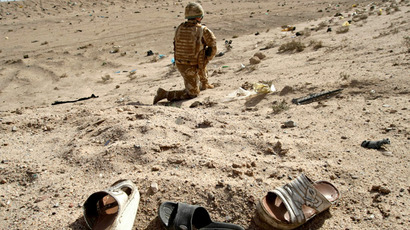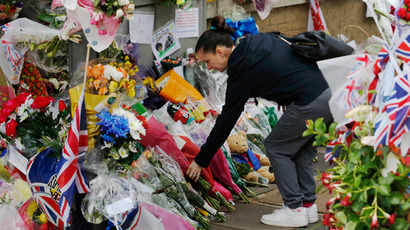UK police implicated in US Senate’s Afghanistan ‘kill list’
A UK court case has alleged the British handed over target information for a secret military “kill list” in Afghanistan. Lawyers argue that UK authorities overstepped the mark, illegally providing information that led to targeted killings.
Papers with evidence of the UK’s Serious Organized Crime Agency’s
involvement in a ‘kill list’ were submitted to the court on
Wednesday, reported the Guardian. They pertain to the case of
Habib Rahman from Kabul who lost two of his brothers, two of his
uncles and his father-in-law in a blundered strike in 2010 in
Takhar province.
NATO was believed to be aiming for Muhammed Amin, a member of the
Islamic Movement of Uzbekistan.
British lawyers representing Rahman are calling for a judicial
review of the Serious and Organized Crime Agency’s (Soca) role in
the killings. They allege that Soca’s contributions to Nato’s
Joint Prioritized Effects List (JPEL) violate the organization’s
mandate and are illegal.
Soca works to fight organized crime internationally, working
closely with partners around the world.
"The UK's involvement in the list is not limited to military
or intelligence officials but includes civilians working for
SOCA,” say the papers filed to the high court obtained by the
Guardian.
"The statements made by the Soca officer quoted in the report
and by others during my trip to Afghanistan led to my
understanding that Soca was indeed involved in collecting and
evaluating evidence as part of the preparation of the
[list]," said a witness statement from Douglas Frantz who was
chief investigator for the committee of foreign relations in the
US Senate at the time of the attack.
The UK Ministry of Defence and Soca both maintain that no
concrete evidence to link British intelligence to the attack has
yet been established and they work strictly within the bounds of
international law.
"Our activity overseas is conducted in line with other UK
government departments, which comply with the principles of
international humanitarian law and human rights,” said Soca
in a statement in September of last year when Rahmen began the
legal process. The UK organization added that it “does not
discuss” intelligence matters.
In 2012 the UN calculated that at least 14,728 civilians have
died in the fighting in Afghanistan since N ATO forces intervened
in 2001.
The UK has come under fire before for its human rights record in
Afghanistan. In May reports emerged that Britain was holding 80
to 90 people in detention facilities in Afghanistan without
charges. The UK is only authorized to hold suspects for 96 hours
without charges.
The facility was condemned by lawyers as being the UK equivalent
of Guantanamo Bay. In response to the reports, UK Secretary of
Defense Philip Hammond issued a statement saying the prisoners in
question would be returned to Afghan jurisdiction as soon as
possible.
The UK parliament claimed they were ignorant of the presence of
the detention facility and maintained they found out about it
through press reports.
The issue of Afghan citizens being held by the US-led alliance
force is a bone of contention with Kabul. President Hamid Karzai
has expressed a number of times that Afghan prisoners should be
transferred to the country’s authorities. The last of the
alliances forces are scheduled to withdraw from Afghanistan in
2014.














